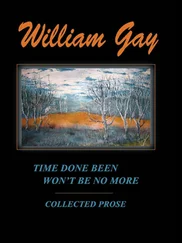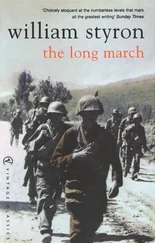He underestimated the dryness of the chaff and last year’s hay: when he threw the match it very nearly exploded. An enormous wall of heat assailed him, knocking him backward. He scrambled down the ladder swearing and feeling to see was his hair afire. There was a fierce muttering above him and he could smell the clean scent of the hay burning. He wasted no time. He went past the tractor parked in the hall of the barn and through an eight-foot wall of pokeweed and through the fence and began to climb the hill, his breath coming harder, the white shirt plastered to his sides and stomach.
He paused halfway up the hill and watched through the gap in the cedars. The glade below danced with heat, a fierce quarter acre of hell consigned here shimmering and vibratory with menace, smoking bits of lathing falling into the dry sedge and small, bright flames darting playfully into the lot, a growing tide of fire that rode the crest of sedge toward the house like a wave on water. A landscape from a palette of fire. The tin curled and was blown off smoking into the wilting pokeweed and he could hear the enormous Whoof Whoof of the fire sucking, drawing off air from the hollow flue.
When she finally did come out he knew it not by seeing her but by the screech of her voice and even that seemed strange in the glassy air, something grating and mechanical, a shrieking of metal on metal. The voice through the fire came distorted and fragmented, foreshortened then elongated. When he heard the grinding of the truck motor even that sounded like nothing he’d heard before. Filtered so by the fire it intercut with her voice, became surreal, a garbled electronic shrieking there was no one about to hear.
A warrant was sworn out and Bellwether arrested him. Pearl followed the squad car back into Ackerman’s Field and he was on the street within the hour. In a week he appeared before Judge Humphries and the case was bound over to the grand jury. When the jurors met they threw it out. They decided there was insufficient evidence for prosecution and that they all owned barns.
Weiss’s wife was named Alma. She didn’t have much to say and when she did speak her voice was a wheeze like air leaking from a broken accordion in one endlessly sustained note. She had asthma attacks. Each breath she took was audible from several feet away. Winer caught himself waiting for her to breathe, holding his own breath. Then it would come, the tone of the wheeze breaking off in an agonizing pause when her lungs were filled, changing then, the pitch lowering as if some tension had been relieved, then the battle for oxygen would begin again.
She had a small dog she perpetually clutched in her arms and she swore it had saved her life during three separate asthma attacks. It was a breed Winer was unfamiliar with and it was the ugliest dog he had ever seen, possibly the ugliest anything he had ever seen. He judged it some model of lapdog. It had a mouthful of tiny needle-sharp teeth like some malign form of life dredged up by appalled fishermen from the keep of the sea. It did not like Winer any more than he liked it and it would bare its teeth and snap at him from the safety of the woman’s cradling arms in a gesture curiously catlike. It had black, shiny, bulbous eyes devoid of any emotion remotely doglike and with its bulging eyes and spiderlike limbs it looked like some grotesque insect the old women had taken to her bosom. Their fates were intertwined, for when she died in September that year the dog was put to sleep as well and placed in her coffin, a talisman whose own luck had run out.
“They say he went crazy and pulled a gun on Ratcliff,” Sam Long told Winer in town the Saturday after she died. Long was arranging the boy’s purchases in a cardboard box, totting them up in a ticketbook. “Ratcliff doin all he could to save her and Weiss throw down on him with a pistol thataway. Ratcliff said he was just a rippin and a rarin. Said he said, ‘You let her die and by God you die with her.’ Old Ratcliff told him, ‘Son, can’t nobody but God Almighty blow breath back into the dead woman and he ain’t no more impressed with pistols than I am.’”
“Are they burying her around here?”
“Lord, no, boy. You think the ground around here is sacred enough for old man Weiss? I reckon not. He hired a ambulance all the way to Nashville. Puttin her in one of these aboveground tombs, what I hear.”
Winer remembered the Sandburg book she had given him. In the dust, he thought. In the cool tombs.
He took up the cardboard carton and balanced it on his left shoulder, steadied it with a hand. He moved toward the door and opened it onto the hot sidewalk.
“I’ll see you.”
“You come back,” Long said automatically.
The door closed behind Winer with a soft ching from the bell and burdened with the box he went on down the street toward the cabstand.
Motormouth came out of the pasture past the looming bulk of the barn and halted where the moon threw cedared shadows, paused a moment to gain his bearings. A thin figure propelled by sheer anger dark to dark and shadow to shadow past the barn and on to the house. The world lay in a grail of silence, the only color a square of yellow light a window threw misshapen into the yard. One shadow among the others less mobile, he moved past the truck in a soundless lope through unprotected light, the gun clasped across his chest, gaining invisibility momentarily in the accumulation of shadows against the wall.
He lay in the grass. It had just been mown, he could smell it, could feel it, wet with dew, adhering to his bare arms. Slowly he began to rise, straightened to a crouch, scarcely daring to breathe. The screen was cool against his cheek.
The room was yellow. He could see three-quarters of the bed and a man’s freckled arm, a yellow wall bare save for a door and a calendar with a scene of a lovable waif wending his way down a country road, fishing pole on his shoulder. Unloved and perhaps unlovable, Motormouth straightened further when the door opened and a young woman came through it. She was young and pretty, Motormouth’s wife. She wore a peachcolored slip and now she drew it over her head in one smooth motion, tossed her hair, breasts bobbing, turning toward the lightswitch. He stared at the darker thatch of her pubic hair as the room went down to darkness. He fumbled open his clothing, spent himself in an act of bitter solitude, affected more by the sight of her naked now than in all the nights she’d willingly shared his bed. He moved limberkneed back to the truck, more confident now that the lights were out.
He brought out a packet from his hip pocket, unwrapped it. A soft avalanche of sugar down the throat of the gastank. “One lump or two?” he asked it. He moved on toward the barn, a figure curiously simian in the cold night. Somehow the sugar did not seem enough. He could smell the sour ammoniac odor of the horsestalls. He brought out his wirecutters and knelt in the grass. He could hear the soft shuffling of the horses. The woven wire clicked when he cut it, when he was through he went on to the barbed wire. The barbed wire was taut and it clanged when he cut it and sprang away into the darkness. The moon slipped behind a cloud and the horses were lost to his sight. He could hear them moving about the pen fretfully, almost furtively.
He pocketed the cutters and took up his rifle and turned hurriedly back toward the woods. The cloud passed the moon then and its huge shadow paced him, dreamlike, through the surreal field of silver weeds.
In Hovington’s last days they moved his bed out of the long front room and into a side room as if the sight of his dying might offend the sensibilities of such drunkards and whores as the nights seemed to draw ever more of. The long room held more cardtables now and the jukebox and sometimes late at night couples danced in the end where his bed had been. He’d lie in the darkness and listen to their laughter through the slatted walls, to the thump and slide of their feet on the rough floorboards. Perhaps in these last hours he was grateful for the jukebox. This world is not my home, the Crater family saying. Oh Lord, what will I do? Or perhaps he lay in the darkness and thought no thoughts at all, not even dwelling on the thousand deeds and nondeeds that had brought him to such a pass.
Читать дальше












